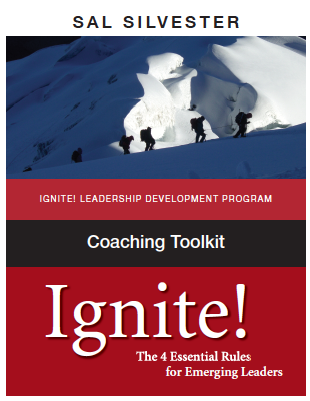Submitted by Sal Silvester on November 29, 2017
 When we work with leadership teams, we push them hard to engage in more conflict. Not the destructive, mean-spirited type, but the productive type where people are focused on the few but consequential issues. We have learned that without productive conflict, team members nod their heads in false agreement and then conduct the real meeting after the meeting.
When we work with leadership teams, we push them hard to engage in more conflict. Not the destructive, mean-spirited type, but the productive type where people are focused on the few but consequential issues. We have learned that without productive conflict, team members nod their heads in false agreement and then conduct the real meeting after the meeting.
And you know what happens afterward...
… decisions get revisited over and over again.
Submitted by Sal Silvester on October 30, 2017

In our July post and September post we outlined 9 costly behavioral traits that stall or kill a leader’s career. To conclude our series, we added the remaining 7 career derailers below that most commonly show up in our executive coaching and leadership development engagements.
They are avoidable, but you have to know about them first.
Here they are. Oh, and we added a bonus derailer that you won’t want to miss if you are worried about losing credibility.
Submitted by Sal Silvester on September 20, 2017

In our July post we outlined 4 common and costly behavioral traits that we notice consistently in our executive coaching engagements that stall or kill a leader’s career. It was one of our most read posts and people wanted more. In fact, one subscriber even said, “Aren’t there more than four?”
The answer, of course, is yes there are more than four career killers. We've noticed 16 pretty common derailers as we work with people across leadership levels, gender and industry. So, we decided to dedicate this post and the next post to introducing those derailers. They are avoidable, but you have to know about them first.
Here are the first 9 derailers.
Submitted by Sal Silvester on August 8, 2017
All first-time parents have experienced the conversation where well-intentioned acquaintances tell us – “everything is going to change.” Frankly, that "advice" isn’t helpful. It sure didn't help me understand how things would be different as a father and as a parent. As a result, I wasn't able to take any actionable steps based on those generic words of wisdom.
Submitted by Sal Silvester on July 5, 2017
 The Peter Principle, first formulated by Laurence J. Peter, predicts that you will get promoted up to your level of incompetence. For most people, that’s far too late.
The Peter Principle, first formulated by Laurence J. Peter, predicts that you will get promoted up to your level of incompetence. For most people, that’s far too late.
Submitted by Sal Silvester on June 13, 2017
 Unite! The 4 Mindset Shifts for Senior Leaders is now an international Best Seller hitting the top of the Amazon leadership and management categories in the US, Canada, Germany, Japan and Australia! Thank you for supporting our very successful book launch.
Unite! The 4 Mindset Shifts for Senior Leaders is now an international Best Seller hitting the top of the Amazon leadership and management categories in the US, Canada, Germany, Japan and Australia! Thank you for supporting our very successful book launch.
Submitted by Sal Silvester on April 25, 2017
 Our work with senior leaders, both through executive coaching and confidential verbal interviews, has revealed that one of the biggest complaints team members report about their senior leaders is a lack of transparent communication. Of course, when you ask senior leaders, they often think they are over-communicating.
Our work with senior leaders, both through executive coaching and confidential verbal interviews, has revealed that one of the biggest complaints team members report about their senior leaders is a lack of transparent communication. Of course, when you ask senior leaders, they often think they are over-communicating.
The result of this perception of the lack of transparent communication is a reduced level of trust and feeling valuable. In turn, there is an impact on the business: slower decision-making, and misalignment due to a lack of commitment.
Submitted by Sal Silvester on March 28, 2017
 I am excited about the launch of my next book Unite! The 4 Mindset Shifts for Senior Leaders in May 2017. This will be the second in our People-First Leadership Series. What I’ve discovered and written about in Unite! is that senior leadership is less about skill development and more about behavioral change. That’s the work I focus on as an executive coach and the differentiator between senior leaders who succeed and fail.
I am excited about the launch of my next book Unite! The 4 Mindset Shifts for Senior Leaders in May 2017. This will be the second in our People-First Leadership Series. What I’ve discovered and written about in Unite! is that senior leadership is less about skill development and more about behavioral change. That’s the work I focus on as an executive coach and the differentiator between senior leaders who succeed and fail.
But behavioral change isn’t easy. Our executive coaching and business training experience shows that without the right ingredients, sustained change rarely happens. Here are the five key components that I believe must be in place to win in the behavioral change game.
Submitted by Sal Silvester on February 17, 2017
 After having coached thousands of people over the past 15 years, I’ve noticed patterns about what the most successful people do. In today’s world, where busyness is rewarded, one of the patterns that stands out in how successful people live, is that they have daily habits that create focus and lead to productivity, fulfillment and happiness.
After having coached thousands of people over the past 15 years, I’ve noticed patterns about what the most successful people do. In today’s world, where busyness is rewarded, one of the patterns that stands out in how successful people live, is that they have daily habits that create focus and lead to productivity, fulfillment and happiness.
If you’re like most people, your calendar is packed, your to do list is long and there’s never enough time in the day to get it all done. You go from meeting to meeting with no space in between (one meeting ends at the top of the hour and that’s exactly when the next begins). It can feel like being on autopilot while riding a roller coaster at your favorite theme park. And the roller coaster never ends.
Submitted by Sal Silvester on January 23, 2017
 Do you want to make a measurable difference in the performance of your people?
Do you want to make a measurable difference in the performance of your people?
What would it be like if all of your team members were highly committed to you and the business?
As we work with leaders and executives around the world, there’s one skillset that differentiates the good from the great. The great leaders are always great coaches. Hands down.
Pages